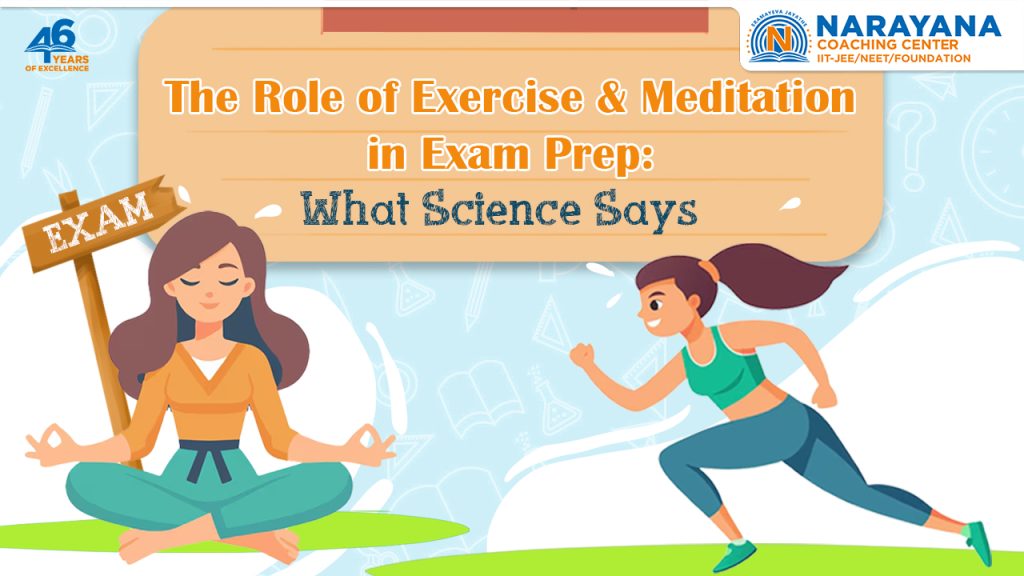
Exam preparation can be overwhelming, leading to stress, fatigue, and decreased cognitive performance. However, science suggests that incorporating exercise and meditation into your study routine can significantly enhance memory, focus, and emotional resilience. In this article, we’ll explore how these two powerful techniques can improve academic performance and overall well-being.
The Science Behind Exercise & Cognitive Function
Physical activity has a profound impact on brain health and cognitive abilities. Studies have shown that regular exercise can:
1. Boost Memory & Learning Ability
Exercise increases blood flow to the brain, promoting the growth of new neurons, particularly in the hippocampus, a region crucial for learning and memory.
2. Reduce Stress & Anxiety
Exercise triggers the release of endorphins, which act as natural mood stabilizers. This can help reduce exam-related anxiety and create a more relaxed study environment.
3. Enhance Focus & Concentration
Physical activity increases levels of neurotransmitters like dopamine and norepinephrine, which improve attention span and focus, essential for efficient studying.
Best Types of Exercise for Exam Prep
Not all exercises are equally beneficial for cognitive performance. Here are some of the best workouts for students:
1. Aerobic Exercises (Running, Cycling, Swimming)
These increase oxygen flow to the brain, improving cognitive function and memory retention.
2. Yoga & Stretching
Yoga combines movement with controlled breathing, which enhances both physical and mental relaxation, reducing stress and improving focus.
3. Strength Training
Lifting weights or doing bodyweight exercises can improve cognitive function by increasing neurotrophic factors that support brain health.
The Power of Meditation in Exam Preparation
Meditation is another scientifically backed strategy that can enhance cognitive performance. Regular mindfulness practices help students cope with stress, enhance memory, and increase overall focus.
1. Improves Memory Retention
Meditation enhances gray matter density in the brain, particularly in areas associated with memory and learning.
2. Reduces Exam Anxiety
Mindfulness meditation decreases cortisol levels, the hormone responsible for stress, leading to a calmer and more composed mindset.
3. Boosts Concentration & Focus
By training the mind to stay present, meditation enhances the ability to concentrate for extended study sessions.
Best Meditation Techniques for Students
Different meditation techniques can help students achieve better mental clarity and relaxation. Here are some of the most effective ones:
1. Mindfulness Meditation
Focuses on breathing and staying present, helping to reduce distractions and improve study efficiency.
2. Guided Visualization
Involves picturing success in exams, which can increase confidence and reduce performance anxiety.
3. Body Scan Meditation
A technique that helps students identify and release tension in their bodies, promoting relaxation and better sleep.
How to Incorporate Exercise & Meditation into Your Study Routine
To maximize the benefits of these techniques, integrate them strategically into your exam preparation plan.
1. Schedule Short Exercise Breaks
Incorporate 20-30 minutes of moderate exercise into your daily routine to refresh your mind and body.
2. Practice Meditation Before Study Sessions
A short 5-10 minute meditation session can enhance focus and set the tone for productive studying.
3. Use Exercise as a Stress Reliever
Whenever you feel overwhelmed, take a brisk walk or do some light stretching to reset your mental state.
4. End Your Study Day with Meditation
Practising mindfulness or guided relaxation at night can improve sleep quality, which is essential for memory consolidation.
Conclusion
Exercise and meditation are scientifically proven methods to enhance cognitive function, reduce stress, and improve overall academic performance. By incorporating these practices into your exam preparation routine, you can boost memory retention, increase focus, and manage exam anxiety effectively. Whether it’s a short jog or a 10-minute meditation session, these small habits can make a significant difference in your study success.
FAQs
1. How often should I exercise during exam preparation?
Aim for at least 20-30 minutes of moderate exercise, 4-5 times a week for optimal cognitive benefits.
2. Can meditation replace sleep for better studying?
No, meditation can improve sleep quality but cannot replace the cognitive benefits of proper rest.
3. What is the best time to meditate while studying?
Before study sessions to enhance focus or before sleep to reduce stress and improve retention.
4. Does yoga help with concentration?
Yes, yoga improves breathing, reduces stress, and enhances mindfulness, all of which aid concentration.
5. Can I combine exercise and meditation for better results?
Yes, practising both ensures maximum cognitive and emotional benefits, creating an optimal study environment.
